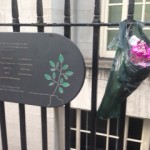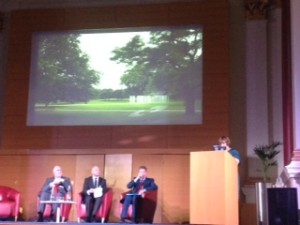 Outside BMA House a solitary bunch of purple stocks hangs from the railings, alongside the memorial plaque to victims of the Tavistock Square suicide bomb attack on a London bus 10 years ago.
Outside BMA House a solitary bunch of purple stocks hangs from the railings, alongside the memorial plaque to victims of the Tavistock Square suicide bomb attack on a London bus 10 years ago.
As passers-by stop to read the names of the dead, inside the building survivors of the blast, along with bereaved friends and family, join members of the emergency services for the annual 7/7 Tavistock Square Memorial Trust lecture.
A total of 52 people died and more than 800 were injured in the terror attacks on July 7 2005, when three bombs exploded on the London Underground. Thirteen of them were killed when at 9.47am, a fourth bomb blast tore the roof off a bus and ripped apart the rear of the vehicle as it passed through Tavistock Square, where the BMA’s London HQ is based.
Staff and doctors working in the building, and delegates attending a conference there, rushed to help victims using basic first aid equipment.
A day earlier London had won the 2012 Olympic bid. Former Labour MP Tessa Jowell, Olympics minister at the time, was celebrating when her office called her in Singapore with news of the bomb attack.
She flew home immediately to lead the UK government’s response, having fulfilled a similar task for families of UK victims of the 9/11 tragedy in 2001.
 Jowell, now a London Labour mayoral candidate, delivered this year’s memorial trust lecture on 29 June. The event was lent added poignancy due to the events in the Tunisian beach resort of Port El Kantaoui four days earlier.
Jowell, now a London Labour mayoral candidate, delivered this year’s memorial trust lecture on 29 June. The event was lent added poignancy due to the events in the Tunisian beach resort of Port El Kantaoui four days earlier.
Student Seifeddine Rezgui was shot dead after killing 38 people, most of them British holidaymakers.
Jowell said the newly bereaved families were “beginning that same long journey of mourning and loss, which the families of those London victims have been travelling ever since that dreadful morning.” She herself fought back tears as she slowly read out the names of the 52 fatalities of 7/7.
Her speech described how Londoners’ delight and euphoria over a surprise Olympic bid victory had “given way to disaster, despair, gripping apprehension, unbearable anxiety.”
The four London bombers left their homes that morning, two of them with small children, expecting never to return, she argued. Are we any closer to understanding what leads people to do this?
Certainly, she argued, they “failed utterly” in their push to “set the government against the people, race against race, non-Muslims against Muslims, eroding trust and understanding.”
But her overarching theme was about the city’s humanity and resilience as it fought back.
Jowell had many examples, ranging from the heroic efforts of Tube and bus workers, the establishment of a makeshift mortuary at Angel station, the provision of 1200 hospital beds in three hours, and the fact that within two weeks of the tragedy the London Bombings Relief Charitable Fund had paid out £10.5m in donated cash.
But lessons had been learned too, she added. Staff looking after non-emergency hospitals near the incident were poorly briefed. “People were wandering around London and there was a sense of chaos and fear. People didn’t know where their relatives were, didn’t know if they were safe. At one point, 40 000 people were reported missing.”
The mobile network collapsed under the pressure, causing problems for London Ambulance, or, as Jowell put it: “So many distressed calls for help, so many plaintive requests for reassurance went unanswered in the void. But then, for the lucky ones, the network was restored and the call came. For some, though, the call did not come and never will. For some the connection will never be restored.”
She told the audience: “In the years since, many of you have, in an inspiring and generous way, found your own private way of translating your love for the person you lost into practical help for others across the world.”
These include:
• The Miriam Hyman Children’s Eye Care Centre in Odisha, India.
• An award named after Healthcare Commission trainee analyst James Mayes, given to the best student project on the Open University’s “Islam in the West” course.
• Julie Nicholson’s tribute to her daughter—A Song for Jenny—now a BBC film being shown at 9pm on 5 July.
The city’s resilience, she argued, culminated seven years later in the “glorious summer” of 2012, symbolised by the Olympic flame.
Jowell concluded: “The bombs brought fire and death; but I recall that one of the Olympic symbols is a torch. That was the fire which lit London three years ago, which London will carry forever, and in whose flickering light the names of those who died will live for evermore.”
You can read Tessa Jowell’s memorial lecture in full on the New Statesman website.
David Payne is digital editor, and readers’ editor, The BMJ.
